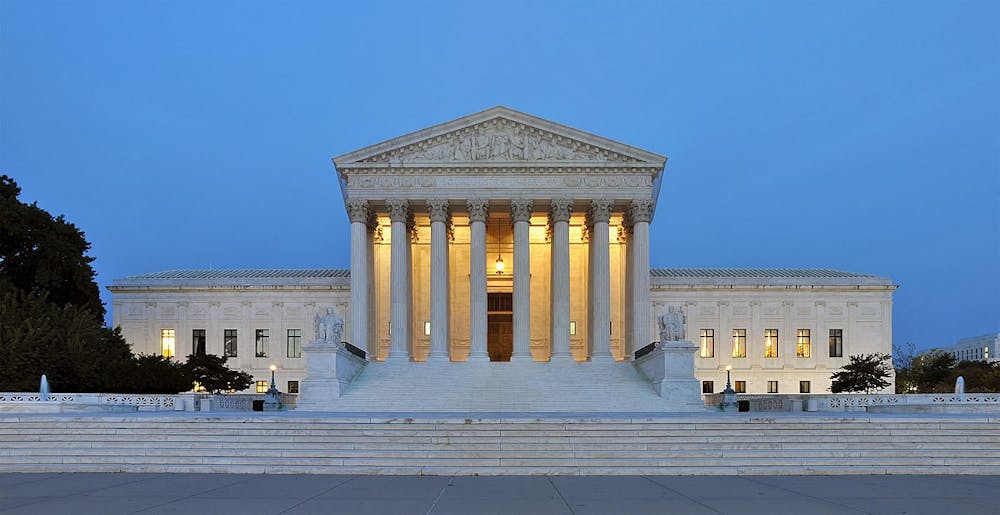When Colorado and Maine made the decision to remove former President Donald Trump from their ballots back in December 2023, and based their decision on Section 3 of the 14th Amendment, I was surprised to see concrete action taken on disqualifying him from the elections. I thought responses to Trump’s presidential candidacy wouldn’t go further than complaining and criticizing his past actions.
The Supreme Court has been discussing whether states hold the authority to disqualify candidates and indicated skepticism about letting Colorado kick Trump off of their ballot. These debates became of particular interest to me as a Turkish person who witnessed the Turkish presidential election in May 2023. In that election, the legitimacy of current president Recep Tayyip Erdoğan’s candidacy was challenged since the Turkish constitution states a person may not run for presidency more than twice. I see a lot of correlations between Trump and Erdoğan: The previous, highly idolized president who has been involved in a range of scandals (Trump’s January 6th Capitol Attack is Erdogan’s December 17th Scandal) is attempting to run again, yet faces legal obstacles.
I thought to myself, that if Erdoğan managed to circumvent the law and run for the presidency despite the impediments, Trump could also do the same. Sometimes a single man can overpower an entire constitution. However, I decided to be objective and look into the law to see if Trump should actually be removed from the ballot or not. As a result, I argue that Trump shouldn’t be disqualified for two reasons: the section’s inapplicability to his case and the possibility of causing electoral chaos.
Section 3 of the 14th Amendment asserts a person who has “taken an oath... as an officer of the United States... to support the Constitution of the United States” and then “engaged in insurrection or rebellion” can be disqualified from serving in a wide range of federal and state offices through a vote of Congress.
In the Colorado Supreme Court, whether the president is included in the “officer” definition of the section was deliberated. This was interesting to think about, as, if the president does not count as an officer of the US, this means that a person who has been involved with insurrection may not serve as a senator yet can serve as the president.
Logically, shouldn’t we count the president as an officer? We’ve all learned about the transitive law back in elementary school. If federal officials are included in this definition, and if a president is a federal official, then the president should be covered by this definition.
However, when we look into historical records, we realize that this might not be the case, as text overlaps between Section 3 of the 14th Amendment with other clauses in the constitution (such as the Impeachment Disqualification Clause) show that the words “office” and “officer” have been used without including the president or the vice president in them. One such example is the Impeachment Clause, which states “The President, Vice President and all civil officers of the United States.” If the president was in fact referred to as an officer of the US in the constitutional language, then this clause wouldn’t be phrased in a way suggesting that the president is separate from the officers of the United States.
The point is not whether we think the president should be included as an officer of the US. It is what the law says on paper, and historical evidence shows that presidents were not included in the definition of officer. My opinion is that it is quite expected for people to perceive the president as an officer, and it makes more sense to me that way. However, the law should be applied in the way that it has been enforced in the past for the purpose of consistency — and this means we shouldn’t count Trump as a past officer.
Another concern brought up during the arguments was whether a state can decide on an issue that should be national. Chief Justice John Roberts and Justice Elena Kagan brought up that Colorado’s action might affect the decision-making bias of other states. My perspective on this is that Colorado’s decision to remove Trump from the ballot brought attention to the legitimacy of Trump’s candidacy and encouraged nationwide debates, which I don’t think is harmful by itself. Nevertheless, if Trump’s candidacy was actually illegitimate and Colorado’s action encouraged a national decision to be made for all, then it would be an important step in protecting the U.S. democracy, kind of like what happens in 12 Angry Men.
However, we should not have an election where some states exclude some candidates while others don’t. So, election chaos should be prevented by having an absolute decision for all states. The Supreme Court should make the final decision that all states follow on whether Trump is excluded or not from the ballot.
Some Justices voiced concern about inconsistent election ballots (candidates getting kicked out of only some states’s ballots). One of them was Justice Samuel Alito, who questioned whether Colorado's decision would cause other states to “potentially exclude another candidate from the ballot.” Alito’s question targets Democrats (and anti-Trump people in general) and has the tone of “don't do unto others what you don't want done unto you.” For some, the disqualification of Trump might be important as it would favor current President Joe Biden, Trump’s potential (and unofficially definite) rival for the 2024 elections. Alito’s words attempt to intimidate this group and make them anxiously question, “What if some other state tries to disqualify my candidate?”
I believe that we should be careful to not turn the situation into slippery slope examples. For the sake of the argument, let’s assume that Trump was indeed counted as an officer of the United States as a former president who vowed to support the Constitution, then committed the Capitol Attack and was therefore disqualified. Just because he was disqualified does not mean that some other candidate who did not commit an act that would result in disqualification would be removed from the ballot.
However, I can see the point Alito is trying to make, no matter how faulty his phrasing might sound. States being able to remove candidates from their ballots could create a chaotic electoral map and cause candidates to be disqualified in some states but not others. Overall, both because the President should not be counted as an officer of the United States and a single state should not unilaterally rule out a candidate, the US Supreme Court’s decision should reject efforts to remove Trump from the ballot.
Buse Koldas is a freshman majoring in Chemical & Biomolecular Engineering and Computer Science from Istanbul, Turkey. She is a Social Media Manager for The News-Letter.





